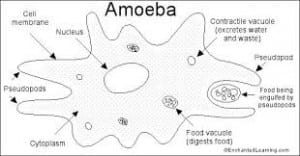The open online course Creativity and Higher Education is making me think. Chrissi asks what is the difference between face to face and online? I say it’s the pedagogy of uncertainty – there’s so much you don’t know and can’t predict. Then Chrissi asks what is the difference between traditional online and open courses? Even more uncertainty. The open structure – emergent ideas – changes in direction – we’re creating as we go along – responding to the unexpected – like an amoeba the course is alive and moving about, ever changing its shape. How exciting is that? We are ‘creativity’ in action.
Last week I blogged about feeling less creative than I thought. This week’s activity reaffirmed it. Identify 3 things you would not use in your teaching.* It was so difficult. I thought everything could be used to demonstrate some point or other. The best response was Jonathan Purdy (from Australia but distance means nothing online) who used categories. What do his teaching tools need to do and does the object support it. I took the question literally and thought Jonathan’s more lateral approach was a perfect example of creative thinking.
In my early HE days as Widening Participation Project Officer I worked with John Knowles who coordinated a Day at University for school pupils in Hull and Lincolnshire. These days were creativity in action. I still remember counting in Japanese! The #creativeHE activities remind me of De Bono’s Hats and Buzan’s paperclips from those days. It was the turn of the century – 2000-2004 – when the internet was new and social media hadn’t happened. How much has technology changed what we do? Have VLE encouraged or dissuaded creative approaches to learning and teaching?

On the course I’m setting up a group looking at digital creativity (yes that’s right folks – feel the google-fear and do it!) At the SRHE Conference in December I’m presenting on the the Digital University and at Bett Technology in January I’ll be talking about TEL adoption. One of my themes is the creative use of VLE – or the absence of anything posing a serious challenge to the dominance of the Lecture – so this might be a useful opportunity to share ideas.
Lectures remain the commonest teaching activity in higher education. Often accompanied by presentation slides – usually powerpoint, for many this is the limit of their digital discoveries. Lecture content might make it onto the VLE – before or after the main event – but there are still those who believe if they put their lecture notes online their students won’t attend.
The commonest word in the literature of VLE is transform e.g. the transformative power of elearning and VLE as transformers of higher education but we’re still waiting. Most VLE resemble digital document dumps. Examples of the creative digital campus are isolated in pockets with widening divides between those who do and those who don’t (i.e. get the whole digital thing).
I feel for anyone who teaches or supports learning and is told here’s the VLE, get on with it. Affinity for digital education is not intrinsic. If tech is not part of your life or subject-expertise how can you be expected to develop digital confidence. It’s a question which has taken a long time to be asked. The risk is those with the answers are not those who understand what techno-fear feels like. We need more creative ways to manage digital adoption.
Next week in the group I’m going to ask for member’s thoughts on creative digital environments. Discussions might go off in directions I haven’t even considered. This is the challenge, the fun and the power of digital education. For a short period of time we have come together in a virtual collaboration. When the course is ended we’ll go off in our separate ways, but hopefully richer and more creative for having taken part in this unique learning experience.
* Activity – name three things you would not use in your teaching
Alcohol – during my first degree a psychology lecturer asked for a volunteer to drink vodka so we could assess the influence on cognitive abilities – during the hour she became more impaired and struggled for the rest of the day. It felt wrong then and still does – I like a glass of wine on a Friday night and another one (or three) over the weekend but for me alcohol and work never go together.
creepie crawlies and slidey slimies – I couldn’t bear the thought of carrying them around never mind having to study them close up – yuk!
Unlike Mrs Heerkens in Holland, I won’t be stripping down to latex body suit any time soon.
https://www.youtube.com/watch?v=JRtW4D0ycA8c



